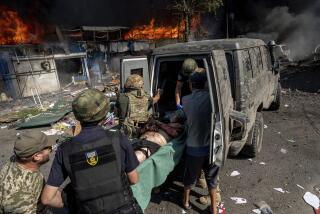Same Old Demons Rip at the New Union : Russia: Economic and ethnic pressures are so ferocious that, without Western help, the conflicts could make a dictatorship look good.
- Share via
MOSCOW — For the last few years, the Soviet people themselves have not had a clear idea where they were going, so the West can hardly be blamed for constantly lagging behind the breathtaking events taking place.
Initially, Western decision-makers were too slow to realize that President Mikhail S. Gorbachev’s reforms were for real, and then they were late in appreciating the decline of central authority and the ascendance of new leaders.
Even now, they probably do not realize that the real problem goes well beyond a decision to recognize newly independent republics or to support reformers in Moscow and elsewhere. There is still an expectation that what used to be the Soviet Union is going to be “fixed” in one way or another by a new leader, by a new arrangement or treaty between the republics, by radical economic reforms.
But the demoralized population and the post-communist political elites possess neither the willpower nor the expertise to dig themselves out of the debris of the collapsed system.
There is almost no chance, in fact, that the former Soviet republics may emerge from the current systemic crisis in a peaceful and orderly way that will not jeopardize global stability. The Soviet economy is not just declining--it is falling apart so completely that even the most radical economic reforms declared by Russian President Boris N. Yeltsin will hardly save it from total collapse.
There are widespread doubts that the reforms will even really be introduced, because of an imminent social upheaval and the opposition of some republics. Even more important, the reform plan is based on an unrealistic assumption that the ruins of the huge, centrally planned economy can be converted into a workable, market-based system within a couple of years. The result of these efforts will just be economic disaster, with a political outcome that cannot be predicted.
Attempts to integrate major Soviet republics, even in a loosely organized community or commonwealth as is now under way, may be frustrated as each tries desperately to protect its own population from the devastating effect of economic collapse. Competing political leaders will undermine not just their rivals’ positions, but also any prospect of future stability.
There is little doubt that Boris Yeltsin will face basically the same problems that Mikhail Gorbachev did, or that centrifugal forces will tear apart the largest republics, like Russia and Ukraine.
Many people are afraid that economic chaos, endemic violence and disintegration of the country will pave the way for a new dictatorship that would be seen by the people as the only way back from the abyss.
Even this dismal scenario may soon be too much to ask. Any dictator would be unable to improve the economy, whose disintegration cannot be reversed in the next year or two. A dictator would also need not just sheer force, but an ideology as well. Today, there are many competing nationalistic ideas in the Soviet Union, but no substitute for the Communist ideology of the past. And if Russian nationalists tried to use the army to restore the empire, it would actually lead to a Yugoslavia-style war--with nuclear weapons to be introduced at some point. Even if nuclear weapons were kept under control, nationalistic chaos in the former Soviet Union would destabilize so many bordering countries both in Europe and in Asia that it could trigger a global chain reaction.
Compared with that, the advent of dictatorship looks like the best-case scenario.
There is still another alternative, however. The West could play a direct and active role in Soviet reforms in order to prevent nationalist chaos in the middle of Eurasia or the emergence of a xenophobic, militaristic regime there.
The Soviet Union suffered a defeat in the Cold War that is no less disastrous than the catastrophe inflicted on Germany in World War II. The West should help the former Soviet Union join the international community in much the same way as it helped Germany.
This effort, actually, should be even more comprehensive as there is yet no basis for a market economy, but there are thousands of nuclear warheads and escalating ethnic conflicts in the former Soviet Union. The first priority is to assure the safety of nuclear weapons.
Even a massive infusion of cash, technology and expertise from the West would not suffice to fix the economies of the republics. Thousands and thousands of Western managers and experts should, probably, come to Russia and the other republics to help construct a rational economic system and modern bureaucracy. And to change the future, a new generation of Russians, Ukrainians and many others should be educated by the West and, probably, in the West.
For the first time in modern history, the West has an opportunity to influence the course of events in Russia and the rest of the former Soviet Union.
Emerging republics are competing not just for resources, but also for political recognition and support from the West. Some of them still do not take literally the Western demands to treat nuclear weapons in a responsible way, to respect human rights and to honor existing borders. However, it should be made abundantly clear to them that any attempt to violate those principles would be met with immediate sanctions. It may have a sobering effect on some of the new leaders.
During the last few years, the Soviet Union, now Russia, has started a turn of historic significance. The West has a unique opportunity to help this huge Eurasian country, now 15 separate states. The United States played a key role in containing the Soviet Union during the Cold War. It should now lead international efforts to integrate its former adversary into the world community.
More to Read
Sign up for Essential California
The most important California stories and recommendations in your inbox every morning.
You may occasionally receive promotional content from the Los Angeles Times.













